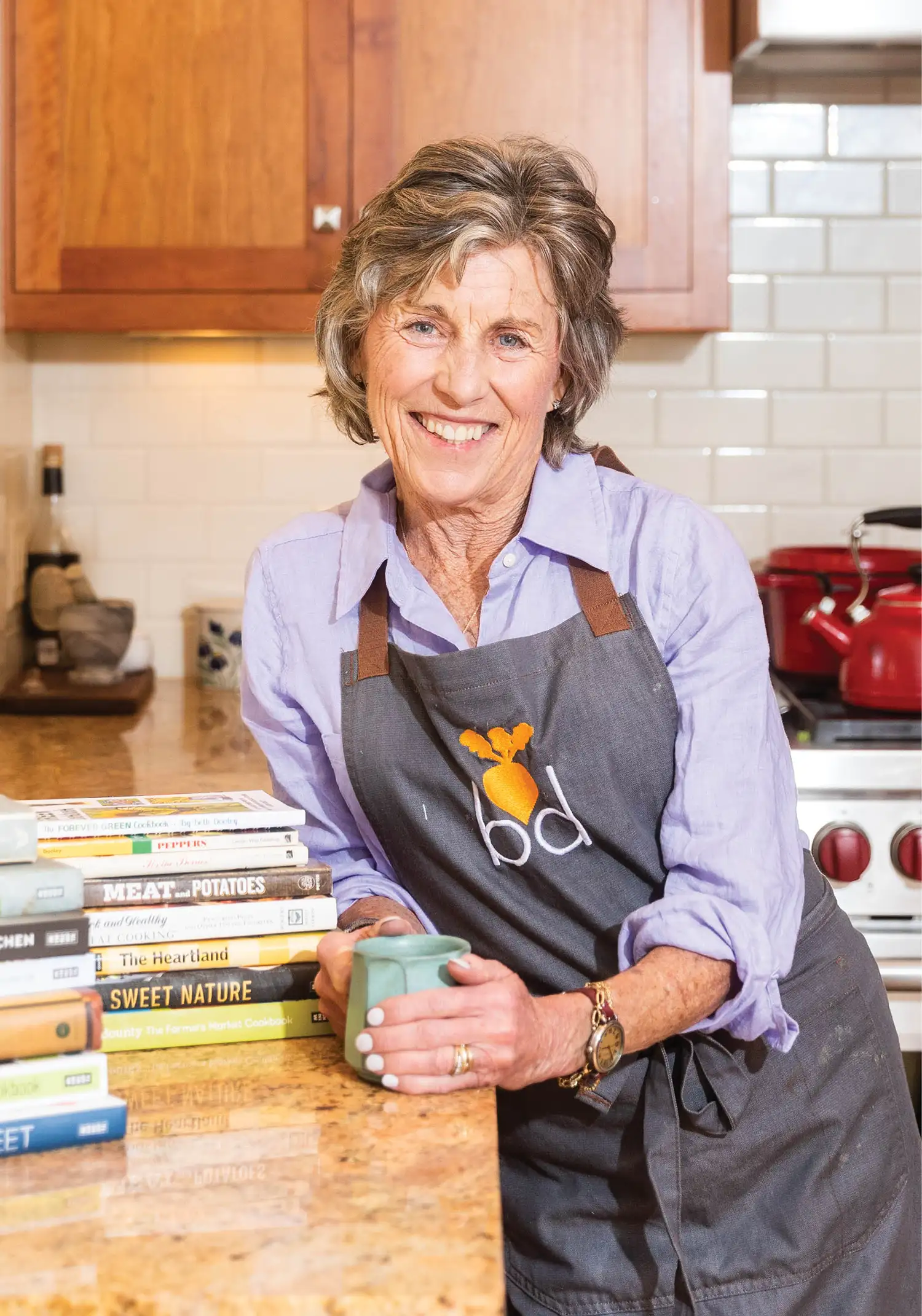Beth
Dooley ’77G
It seems she was destined to blend storytelling and culinary skills not only in a career, but as her lifelong passion.
Soon after graduating from UNH’s MFA program in 1977, she and her husband moved to Minneapolis, where she wrote advertising copy for big corporations like Land o’ Lakes, but also started doing a newsletter for a local CSA, something fascinating to Dooley.
She was meeting farmers, learning about weather, soil, and “all of that lead me to wanting to know more,” he remembers.
“I became a chronicler of the local food system, which was so vibrant … there were more natural food crops here than anywhere in the country,” she says. “We’re in an area where you can see the impact of the large food system and the impact of this emerging local food system, as well as the influx of immigrants from farming cultures, bringing with them traditional practices.”

Judith had edited works by Laurie Colwin, who is one of Dooley’s literary mentors “in terms of the style I wanted to write in.” And she would be integral in Beth’s first book, “Savoring the Seasons of the Northern Heartland.”
At UNH, Dooley says, her years as a graduate student at UNH as a very creative time: She was taking classes on writing, learning from the likes of poet Charles Simic and palling around with novelist Alice MacDermott, reading about the impact of agriculture from the works of environmentalist Rachel Carson, and what clean eating meant from nutritionist Adelle Davis. She lived with friends in a big house rental in Newmarket, and she was always cooking with or for her roommates.
Those grad school meals would be the precursor for Dooley’s present-day career: Literary food writer and award-winning author.
Her writing focuses on home cooking and celebrating the food of the northern heartland — the upper Midwest. She’s published more than 13 books, and in 2018, was lauded with the James Beard Award for Best American Cookbook for her work on “Sioux Chef’s Indigenous Kitchen” with Chef Sean Sherman. For his work in indigenous food, Sherman was named one of Time magazine’s 100 most influential people in 2023.
And because she readily admits “cookbooks don’t always pay the bills,” she is also a senior fellow at the University of Minnesota’s Institute for Sustainable Agriculture, and teaches at nearby colleges.
KEY INGREDIENTS
- James Beard award-winning food writer, strong believer in and advocate for local agriculture and food systems, honoring traditional food ways.
- At UNH, was taught by greats like Charles Simic and was colleagues with future Pulitzer Prize finalist Alice McDermott.
- Her website features recipes and writing, and a weekly Zoom cooking session with one of her sons based on whatever he has in his kitchen.
A peek at her Instagram says it all: there are just as many pictures of goats, raw vegetables, and Beth herself doing farm work as there are of polished, finished plates and faces of famous chefs she collaborates with.
Last year in an interview with Minneapolis/St. Paul magazine, she told a reporter that she could be called a fraud because she feels she’s not living everything she values. “I’m not a hippie on a farm growing my own food. But I am writing about them … I went in all kind of directions as an adult, but a land ethic is something that is deeply embedded in me. What happens when you pay attention to the soil? When you nurture relationships? The work I do is grounded in all that,” she shared in the magazine.
The key to reconnecting with local food wherever you are, says Dooley? “Just start growing something. Or put a pot of water on the stove and make something. If you get interested in your food, you’ll want to learn where it’s grown and who is growing it. And that connects us to the world.”
She notes that on her 45th wedding anniversary, she and her husband “came home to no food in the house.” She boiled and drained pasta, added some local cheese and butter to it once it was done.
And it was delicious.
“Cooking is relaxing, it engages your senses,” she says. “People think that if they’re going to cook it has to be super fancy. It doesn’t.”